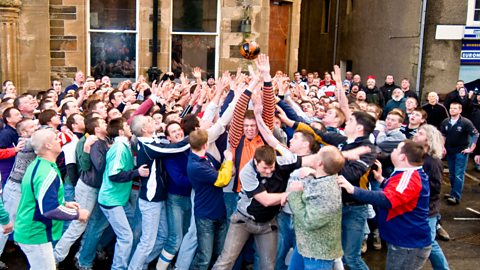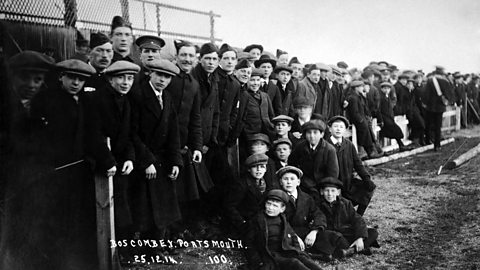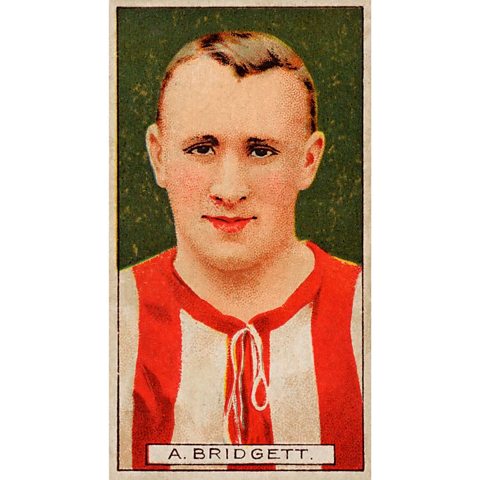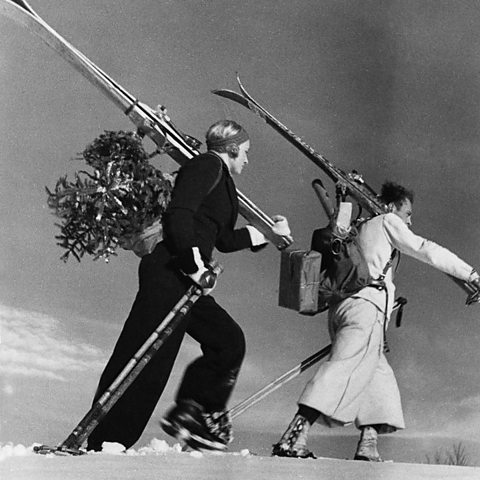Christmas is a time when weÔÇÖre encouraged to have too much of everything - TV, food, time with family, and football.
Premier League teams are expected to play twice a week over Christmas, including Boxing Day and New Year's Day.
Managers - including Jurgen Klopp and Pep Guardiola - and players have lamented the lack of downtime in the football calendar at Christmas, as it makes it hard to spend quality time with friends and family, and a proper break is handy to keep injury at bay.

In most of Europe, it is custom to have a minimum two week winter break over Christmas - although Italy introduced a Boxing Day football fixture for the first time in 2017.
It might be tempting to blame the broadcasters, but the UK has a history of games at Christmas rooted in medieval traditions and hard-fought workers rights that goes back long before Super Sunday or Match of the Day were dreamt up.
We spoke to some experts to shed some light on the British tradition of football at Christmas.
Was there life before football?
Professional football is only a relatively recent invention - the first of the British Football Associations, the FA was only formally created in 1863 - but weÔÇÖve been having festive public games for hundreds of years.
Variations of the game known as medieval football, or mob football, are documented as far back as 1170. Games were often put on at Christmas and Easter and some of these ancient games are played today, such as The Orkney Ba game on Christmas Day and The Royal Shrovetide village game in Ashbourne, Derbyshire.

Football with an extra helping of football, please
Religious holidays and bank holidays have long been a time to pile on the football and there was a time when the top teams played nearly every day at Christmas.
In the Victorian era, ÔÇ£football was played on Christmas day because it was a day off and there was a tradition of public working-class events,ÔÇØ says history professor Martin Johnes. ÔÇ£It was also at times played on Boxing day meaning two games in two days.ÔÇØ For many working people this could be the only chance of the year to catch a game.
In his book Christmas and the British, Prof Johnes explains that bank holiday legislation played an important role: ÔÇ£The 1871 Bank Holidays Act gave Boxing day this designation in England and Wales. It had not done the same for Christmas day or Good Friday because they were established days of rest and worship,ÔÇØ

Football clubs took advantage of bank holidays as they offered the chance of bumper attendances. In the Victorian and Edwardian era, games were often arranged on Good Friday and Easter Monday, with some clubs playing up to three games in four days at Easter.
In 1913, Liverpool beat Manchester City 4-2 at home on Christmas Day, lost the return game 1-0 on Boxing Day, before drawing 3-3 at home with Blackburn Rovers the next day!
While Liverpool's fixture list won't be quite so intense this Christmas, one guarantee is that football will be played on Boxing Day.
Better out than in
A cosy domestic scene is a cornerstone of Christmas today, but in the Victorian and Edwardian era people would have preferred getting out of the house to celebrate.
ÔÇ£For the working class, whose residences were often uncomfortable, overcrowded and unappealing, a rare day free from work was reason to take to the streets, not relax at home,ÔÇØ writes Prof Johnes.
Between World Wars One and Two there were sporting events, pantomimes, cinema showings, folk rituals and informal gatherings on Christmas day.
The ghost of Christmas past
Over the years, the popularity of Christmas day football dwindled. As living standards have improved and food, gifts and decorations have become more affordable. ÔÇ£Communal entertainments were clearly on the decline as the festival took greater root in the home,ÔÇØ says Prof Johnes.
ÔÇ£Football shifts just to Boxing day, as Christmas day becomes more family orientated and more importantly public transport becomes more and more limited.ÔÇØ
The last Christmas Day game in England was in 1965, when Blackpool beat Blackburn Rovers 4-2 at Bloomfield Road.
The last Christmas Day game in Scotland was Saturday December 25, 1976. Clydebank and St Mirren drew 2-2 in a top-of-the-table first division clash and Alloa beat Cowdenbeath 2-1 at home in the second division.
Northern Ireland still hosts the Steels of Sons cup final every Christmas Day - although it shifts to Christmas Eve if Christmas is on a Sunday.

Abstaining on religious grounds
Even though local derbies were often scheduled for Christmas, the demanding schedule put a strain on the players with all the travelling that would have been involved.
If a club misses a game today severe penalties can be administered, but FA rules at the time stated ÔÇ£no club shall be compelled to play any match on Good Friday or Christmas DayÔÇØ.
Swindon TownÔÇÖs Harold Fleming (who played from 1907 to 1924) and SunderlandÔÇÖs Arthur Bridgett (1902 to 1924) were high profile England International players who refused to play on Christmas Day on religious grounds.

Contrasting attitudes
As to why our Christmas football habit contrasts so much with our European neighbours, Dr Alexander Jackson, National Football Museum Curator, suggests it could be down to football being such a traditionally popular spectator sport in Britain.
ÔÇ£It is difficult to say exactly why Christmas games are definitely not a tradition in other countries. Perhaps, the early spread of football in England, comparative to European countries, where it only became a mass spectator sport after World War One, helps explain why it became embedded in Victorian and Edwardian football culture.ÔÇØ

German football journalist Raphael Honigstein - author of biographies of Jurgen Klopp and former Arsenal captain Per Mertesacker - says that the mystery of the difference between British and German attitudes to Christmas reminds him of a classic German joke:
ÔÇ£ThereÔÇÖs this guy driving on the wrong side of the highway. HeÔÇÖs listening to the radio and thereÔÇÖs an emergency announcement saying ÔÇÿplease be careful thereÔÇÖs someone driving the wrong wayÔÇÖ, and he says to himself, what do you mean ÔÇÿone guy,ÔÇÖ thereÔÇÖs thousands of them!ÔÇØ
ItÔÇÖs not the absence of Christmas football in Germany and other parts of Europe thatÔÇÖs surprising - itÔÇÖs the tradition of Christmas football in Britain that seems a bit odd.

ÔÇ£Historically football is also not really a winter sport in Germany as we have other winter sports that take precedent, skiing and sledging, that people go out and do. The Alps is quite close by so the last thing we might do is put on a football game.ÔÇØ
ÔÇ£ItÔÇÖs just a completely different mindset, similar to the contrasting attitude to shopping on Boxing Day. It doesnÔÇÖt have that same tradition in Germany. The shops might be open but itÔÇÖs not a big deal.ÔÇØ
Love it or loathe it, thereÔÇÖs no denying that football is a particularly treasured part of British culture older than many well established Christmas customs practised today.
3 tips to turn festive FOMO into JOMO
Is the fear of missing out threatening to ruin your Christmas? Find out how you can fight FOMO this festive season.

We spoke to Dr Sylvia Knight of the Royal Meteorologist Society to answer six very important cold weather questions.

What was happening the last time we had a December election?
It's not the first time we've interrupted our Christmas shopping to cast our vote.
